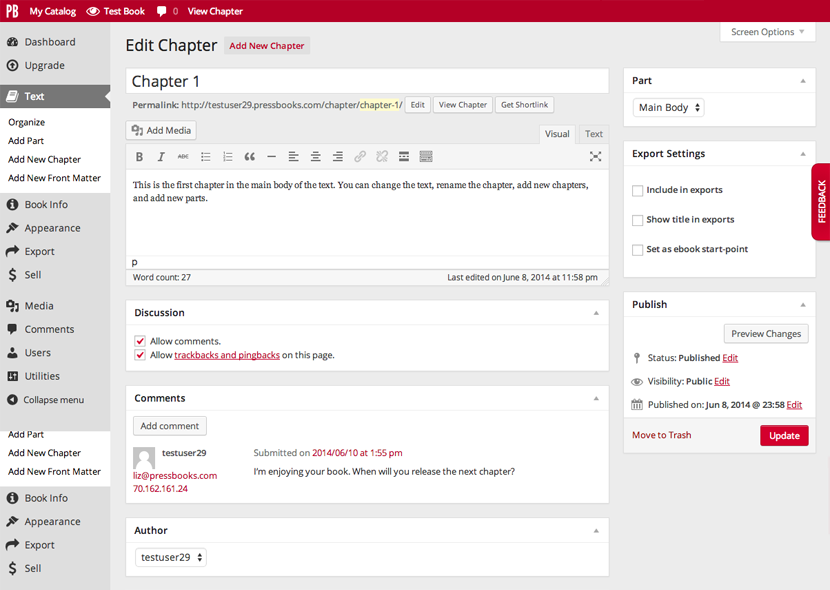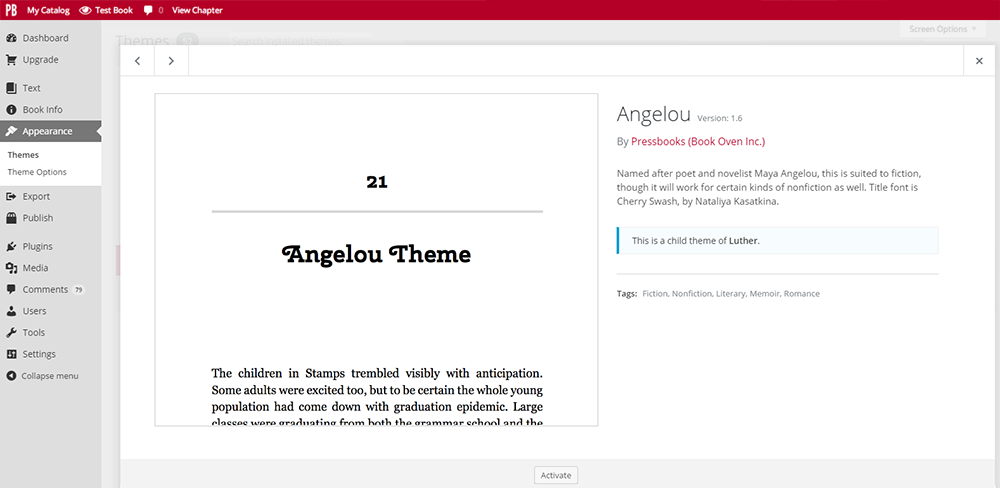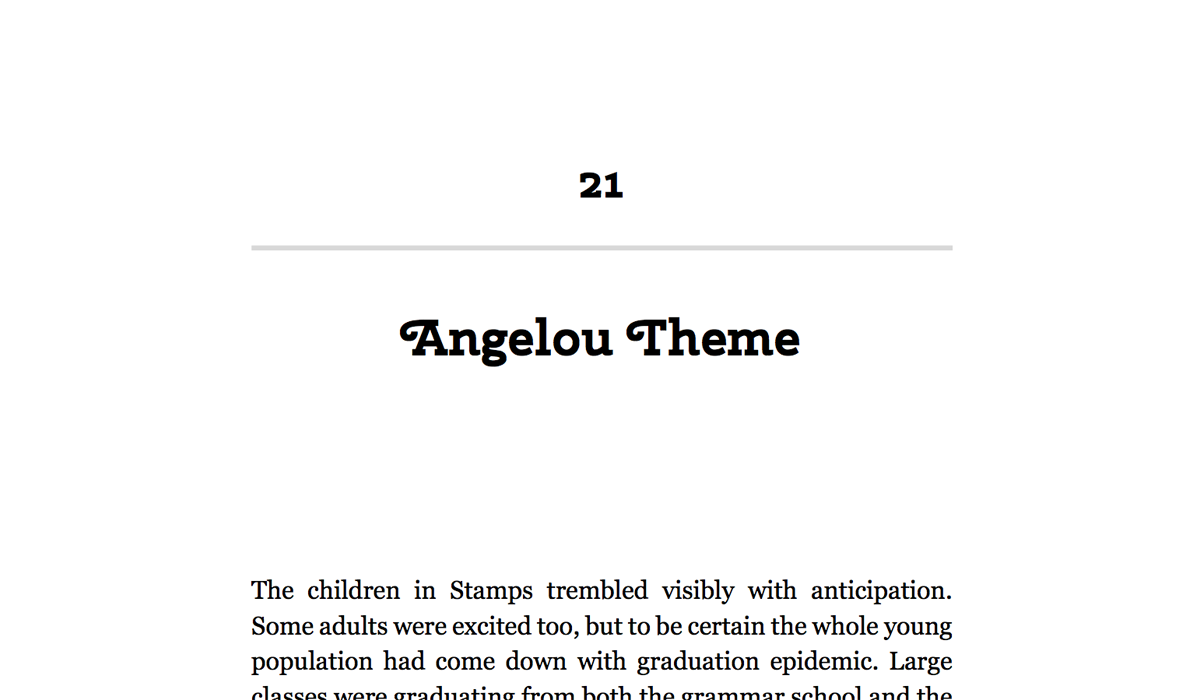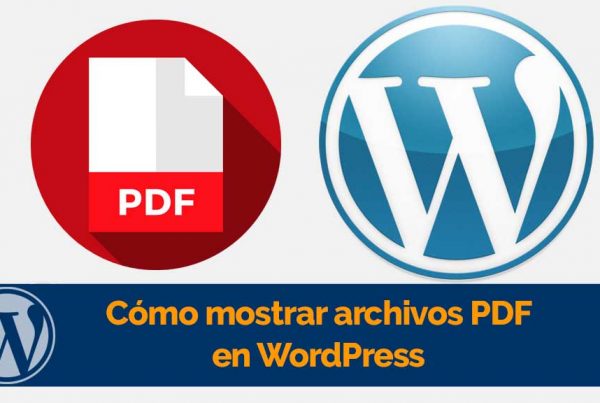Please note that Pressbooks has discontinued support for their plugin and is no longer compatible with WordPress.
If you are looking for a simple and straightforward tool to create, edit, and publish your books, look no further than PressBooks and enjoy creating your book using the beloved WordPress.
PressBooks gives you all the essential tools to create e-books and even print books. It enables you to export your books in all major data formats so your books can easily go in any e-book format for Amazon Kindle, Apple iBooks, Nook, Kobo, and others. You can export your book in PDF for printing on paper, and while creating your books in WordPress, at the same time you can get a familiar XML export.
BookPress is in fact a WordPress MultiSite (WPMS); Users can register on the web to create an unlimited number of books, and each book is a site on the WPMS web site.
The WordPress PressBooks plugin
BookPress MultiSite works with the open source PressBooks plugin. Anyone can download the plugin from Github and activate it on a fresh multi-site WordPress installation to turn it into a book publishing platform.
The developer suggests using PressBook.com as a ready and managed platform. I must say that I agree with him, because publishing e-books is not just creating the export file, there is a new phase of complex work waiting for authors to distribute their book in various major markets such as Amazon or iBook. Now let's see what PressBooks is.
What is PressBooks?

A chapter in PressBooks is very identical to the standard WP publishing formats and includes "chapter metadata" without taxonomies.
PressBooks provides all the essential features of a book, including:
Preliminary subjects, past subjects, parts and chapters, and standard books and chapter metadata. The authors can then organize their books and do the fine finishes.
Authors can create their books privately and export them, but at the same time they have the option to publish their books publicly and users can read the books on a WordPress site installed on a subdomain of PressBooks. There are three themes to choose from as a canvas for books, all themes are minimal and inspired by printed books:

PressBooks theme options
On the interface, PressBooks looks a lot like a paper book:

PressBook Frontend
Pros and cons of PressBooks
PressBooks is reliable, fast, and robust. It does what it says and does it flawlessly, but it does very little compared to the possibilities and expectations. I realize that PressBooks at the base has a background. The bottom line is the compatibility of the exported files with the respected distribution platforms. This is a very legitimate goal, but as a consequence PressBooks lags far behind the latest content publishing trends and is very difficult to monetize and be highly profitable. Let's see why.
Simple and responsive designs
Let's look at the classic Kindle as the pioneer of e-book platforms. Amazon created Kindle, and by entering new data analytics and tech savvy, the smart guys at Amazon knew the era of print media was over. It's only a matter of time until most readers turn to web-based posts.
Well, Amazon has been doing a great job transforming reading technology and, more importantly, changing people's habits. It is one of the hardest jobs to change old habits.
PressBooks builds on the trend that Amazon started. Creating e-books online in an identical format to a paperback makes the books easy to read and familiar to older readers (who may not be as open or tech-savvy as younger generations) .
PressBooks topics are responsive and adhere to a simple single column layout with left / right arrow navigation. This is an efficient design, but not necessarily the most attractive you could ask for. If you like minimal layouts, then you should be good to go with one of the included PressBooks templates. But if you want something with a little more flair or flash, you may consider hiring a web developer to customize the look of your site.
Local-only video inserts
PressBooks does not allow authors to embed third-party videos in their content. This means that you must host your own videos in your own media library if you want to use them (iframes from Vimeo or YouTube are not possible).
But what about the video in an expert PDF? Well there are many possibilities to handle that, I think the simplest practice is to replace the video with a short URL linked to a YouTube or Vimeo version of the video, in PDF format. Still, limiting the user to self-hosted media is a challenge PressBooks has created for itself, especially in an era where YouTube is the gold standard for video.
Microforming
PressBooks has adopted book and chapter metadata, that's necessary but not sufficient. Microformats like Schema.org should be the minimum practices for structuring various data.
Suppose I am writing a cookbook on the PressBooks platform. I need book metadata, at the same time I need recipe metadata. At the same time, I like to have a custom taxonomy with a hierarchy for my ingredients, the top-level categories can be items such as: vegetables, spices, meats, etc. and all ingredients can be organized into subcategories.
Then I can show an ingredient list in the interface to the readers or I can let my readers search for the recipes filtered by custom fields, and they can choose to see all the dishes that contain fish or pepper. WordPress has extensive tools for structuring data with custom metadata, custom fields, custom taxonomies, post formats, and custom post types.
At the same time there are features like geotagging, which can revolutionize the books created by PressBooks. Imagine when you read a book on your tablet, if you see the name of a place in the text and touch it, you will instantly see the Google Street View image of that place in a lightbox.
Currently, PressBooks does not support these features, but it would be a great advantage if they did. This would allow a whole new group of content creators to enter the market. Hopefully, it's something they'll consider adding, but until then, this is something you'll need to check with a web developer to see if a custom theme can be designed for your needs.
Taking Evernote as another example, this app is popular because it helps users write tagged notes, add images, and record audio, all in the same note. This is the type of content that users expect. Evernote made it to organize notes, imagine how awesome it would be if PressBooks added similar features to enrich your books.
Sharing socially
PressBooks supports social sharing buttons for Twitter, Google+, and Facebook within the web version of your books. This is a great way for your readers to share their favorite chapters and give you a little extra exposure. But these are pretty simple, and currently the only option you have is to enable or disable sharing on all of your pages as a whole. It would be nice to see styling options, as well as more social media included.
Monetization
Today PressBooks enables you to create a web-based e-book that can be exported to PDF, MOBI, or EPUB files at the same time. But I don't know of ways to monetize the books you create without adding an additional plugin.
One option would be to create a premium membership for e-books using Restrict Content Pro. Thus, you could make the chapter 1 pages of your books public and block the rest of your content for members. Note: I haven't actually tested the compatibility of these two plugins, but I hope it works fine.
Alternatively, you can sell your books on Amazon, iBooks, etc. The PressBooks formats correctly, so you should have trouble uploading your file for sale. Or you can use WooCommerce or an identical ecommerce plugin to sell PDF versions of your ebooks on your own website. Many scenarios can be determined or considered to monetize the app.
PressBooks Pro
Right now, the PressBooks plugin is completely free, but they offer 3 premium plans if you want to let them manage your book online or the book platform for you. If you want to remove the watermarks from your e-book PDF exports, you will need to upgrade to one of these plans, which start at $ 19.99 (a one-time fee per book).
Book printing
PressBooks offers printing services if you want to produce a paperback version of your e-book. There is an installation fee of $ 50 and a minimum order of 50, but that's it. It is important to note that PressBooks self-printed books do not include an ISBN, just a generic barcode. So if you want to distribute to retailers or libraries, you will need to order your ISBN before printing so that the code is included on your cover.
Alternatively, you can use with BookBaby to print and distribute your book. They offer tons of options, packages and add-ons like print on demand starting at $ 199, ISBN services or even single book printing for $ 19. Check out their pricing page for more information.
BookBaby does not charge fees for sales, but provides a functional dashboard for authors to manage their sales through different channels. In the case of printed books, authors can optionally request small circulations of up to 25 volumes, and it can cost just a few dollars per print.
Ending
PressBooks is a great concept and may be a leader in creating and publishing e-books. There is great potential to create premium and free e-books to promote your website or monetize your blog. Hopefully you'll give it a try, given that PressBooks is a fairly easy way to create WordPress e-books (and when you combine this with our guide to selling e-books with WordPress, you're on your way to success).
So what do you think about PressBooks? Have you tried it? What features do you like? Or is there a feature that you would like PressBooks to have? Let us know and start a conversation in the comments below!
Article written by Pooria Asteraky. You can follow Pooria on Twitter or LinkedIn.





